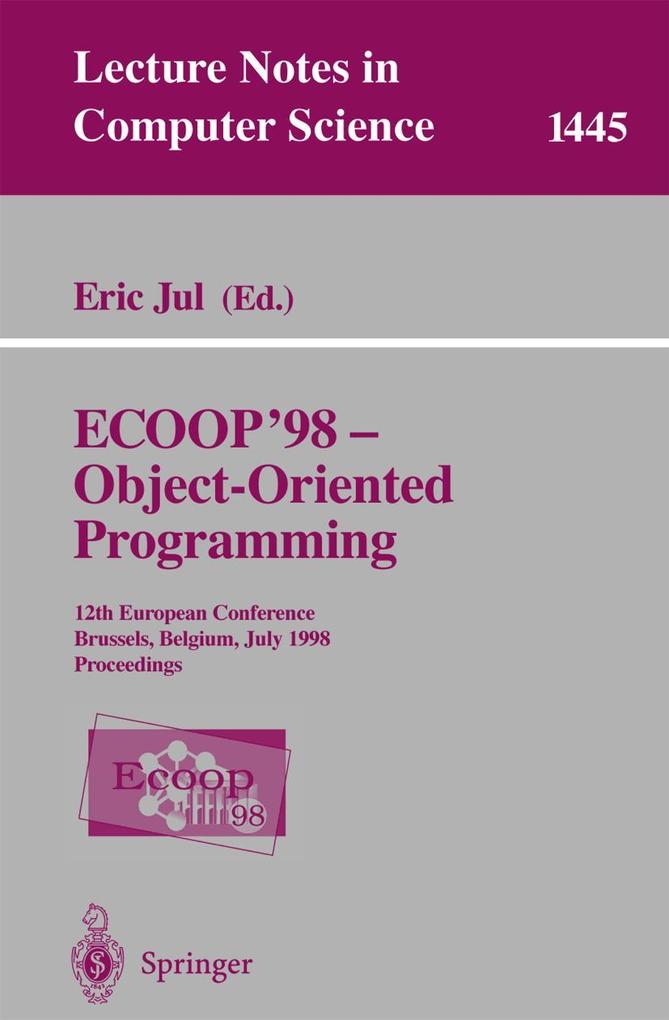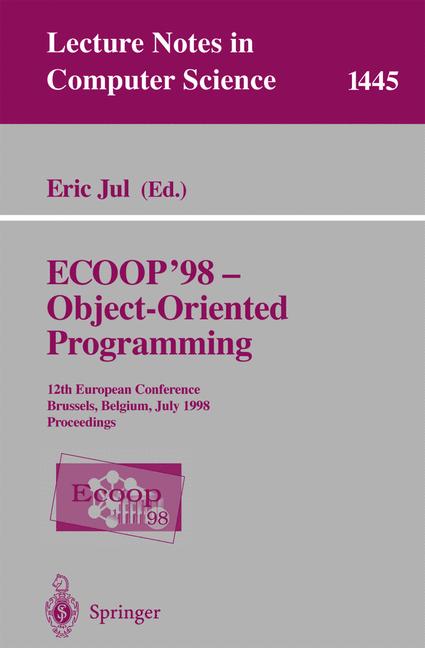
Zustellung: Mi, 11.06. - Fr, 13.06.
Versand in 2 Tagen
VersandkostenfreiBestellen & in Filiale abholen:
This book constitutes the refereed proceedings of the 12th European Conference on Object-Oriented Programming, ECOOP'98, held in Brussels, Belgium, in July 1998.
The book presents 24 revised full technical papers selected for inclusion from a total of 124 submissions; also presented are two invited papers. The papers are organized in topical sections on modelling ideas and experiences; design patterns and frameworks; language problems and solutions; distributed memory systems; reuse, adaption and hardware support; reflection; extensible objects and types; and mixins, inheritance and type analysis complexity.
The book presents 24 revised full technical papers selected for inclusion from a total of 124 submissions; also presented are two invited papers. The papers are organized in topical sections on modelling ideas and experiences; design patterns and frameworks; language problems and solutions; distributed memory systems; reuse, adaption and hardware support; reflection; extensible objects and types; and mixins, inheritance and type analysis complexity.
Inhaltsverzeichnis
Mobile objects and mobile agents: The future of distributed computing? . - The M. A. D. experience: Multiperspective application development in evolutionary prototyping. - Extending the ODMG object model with time. - Modelica A unified object-oriented language for system modeling and simulation. - Synthesizing object-oriented and functional design to promote re-use. - Precise visual specification of design patterns. - Framework design for end-to-end optimization. - Flexible alias protection. - Predicate dispatching: A unified theory of dispatch. - Orthogonal to the Java imperative. - Modelling a distributed cached store for garbage collection: The algorithm and its correctness proof. - Cyclic distributed garbage collection with group merger. - Experiences developing a virtual shared memory system using high-level object paradigms. - Binary component adaptation. - Object-oriented architectural support for a Java processor. - A study of the fragile base class problem. - Providing orthogonal persistence for Java. - Wrappers to the rescue. - Design and partial evaluation of meta-objects for a concurrent reflective language. - Reflection for statically typed languages. - An imperative, first-order calculus with object extension. - On object extension. - A statically safe alternative to virtual types. - Implementing layered designs with mixin layers. - Classifying inheritance mechanisms in concurrent object-oriented programming. - The complexity of type analysis of object oriented programs.
Produktdetails
Erscheinungsdatum
08. Juli 1998
Sprache
englisch
Auflage
1998
Seitenanzahl
660
Autor/Autorin
Eric Jul
Herausgegeben von
Eric Jul
Verlag/Hersteller
Produktart
kartoniert
Abbildungen
XII, 648 p.
Gewicht
984 g
Größe (L/B/H)
235/155/36 mm
ISBN
9783540647379
Entdecken Sie mehr
Bewertungen
0 Bewertungen
Es wurden noch keine Bewertungen abgegeben. Schreiben Sie die erste Bewertung zu "ECOOP '98 - Object-Oriented Programming" und helfen Sie damit anderen bei der Kaufentscheidung.










